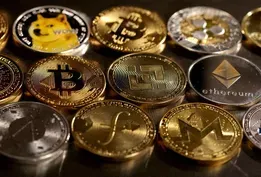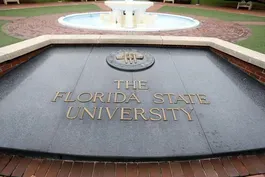
Chicago Fed president on Trump's trade war
Clip: 4/17/2025 | 7m 40sVideo has Closed Captions
Chicago Fed president on Trump's trade war and threats to fire Powell
President Trump took aim at Jerome Powell, calling interest rates cuts and saying the Fed Chair's termination “cannot come fast enough.” It comes as his administration's tariffs continue to cause global fallout. The International Monetary Fund warns it expects slower economic growth and higher inflation. Amna Nawaz discussed more with Austan Goolsbee of the Federal Reserve Bank of Chicago.
Problems with Closed Captions? Closed Captioning Feedback
Problems with Closed Captions? Closed Captioning Feedback
Major corporate funding for the PBS News Hour is provided by BDO, BNSF, Consumer Cellular, American Cruise Lines, and Raymond James. Funding for the PBS NewsHour Weekend is provided by...

Chicago Fed president on Trump's trade war
Clip: 4/17/2025 | 7m 40sVideo has Closed Captions
President Trump took aim at Jerome Powell, calling interest rates cuts and saying the Fed Chair's termination “cannot come fast enough.” It comes as his administration's tariffs continue to cause global fallout. The International Monetary Fund warns it expects slower economic growth and higher inflation. Amna Nawaz discussed more with Austan Goolsbee of the Federal Reserve Bank of Chicago.
Problems with Closed Captions? Closed Captioning Feedback
How to Watch PBS News Hour
PBS News Hour is available to stream on pbs.org and the free PBS App, available on iPhone, Apple TV, Android TV, Android smartphones, Amazon Fire TV, Amazon Fire Tablet, Roku, Samsung Smart TV, and Vizio.
Providing Support for PBS.org
Learn Moreabout PBS online sponsorshipAMNA NAWAZ: President Donald Trump today lashed out at Federal Reserve Chair Jerome Powell, pushing for interest rate cuts and saying -- quote - - "Powell's termination cannot come fast enough."
That comes as the Trump administration's tariffs continue to cause global fallout and uncertainty, and Wall Street is reacting.
The Dow Jones industrial average lost more than 500 points today in another big sell-off.
Tech stocks held firmer, with the Nasdaq only falling minimally, and the S&P 500 gained, but also minimally.
Meanwhile, the European Central Bank cut its key interest rate by a quarter-point amid what its president called exceptional uncertainty, all of this as the International Monetary Fund warns, it expects the world's economy to grow slower this year with higher inflation than previously predicted.
For a closer look at all of this now, I'm joined by Austan Goolsbee, president and CEO of the Federal Reserve Bank of Chicago.
Welcome back to the "News Hour."
Thanks for being with us.
AUSTAN GOOLSBEE, President, Federal Reserve Bank of Chicago: Thank you for having me, Amna.
AMNA NAWAZ: So I want to begin with the latest escalation in what's been President Trump's long-running attacks on Chair Powell.
Here is part of what the president had to say today.
DONALD TRUMP, President of the United States: I don't think he's doing the job.
He's too late, always too late, a little slow, and I'm not happy with him.
I let him know it, and if I want him out, he will be out of there real fast, believe me.
AMNA NAWAZ: So the question is, can the president fire the Federal Reserve chair if he wants to, and are you worried that he will try?
AUSTAN GOOLSBEE: Well, I mean, one of the oldest rules in the book is don't ask legal advice from a guy with an econ Ph.D.
So I don't know the answer to any of that.
What I will say, I, like all economists, virtually unanimous, believe in the importance of monetary independence and that the Fed, by law, has a dual job, maximize employment, stabilize prices, and that's the thing that guides what the Fed's decisions are going to be.
It's got to be based on economic conditions.
We're in an almost unprecedented environment where we're coming into this year and the Q1 of this year, the hard data, quite strong,and now we have added a lot of dirt in the air and I'm out every week talking to businesses here in the Seventh District out in the Midwest, and there's a lot of anxiety that we're turning the page back potentially with the tariffs to something like 2021 and 2022, when inflation was raging out of control, higher than where we wanted it.
And they don't -- they didn't like that movie when they saw it the first time.
They don't -- definitely don't want to go see that movie again.
So I'm just hoping that the conditions warrant whatever changes we need to make and that, if we can get past this period of uncertainty, I still am hopeful that those solid conditions in the hard data can continue, inflation head back to 2 percent, and we maintain solid growth with full employment.
AMNA NAWAZ: Well, based on where we are right now, because, obviously, Chair Powell referenced this just yesterday, he warned about what he called a challenging scenario ahead as a result of these tariffs.
What exactly is he warning about that could be ahead for the U.S. economy if these tariffs continue where they are and if the 90-day pause on those broader tariffs ends?
AUSTAN GOOLSBEE: Well, I will say the rules forbid me to speak for anyone else on the FOMC besides myself.
I have been saying for months, highlighting, because it was expressed to me by the business leaders in the auto industry and in others, that if tariffs are too large, they will move you in the direction deteriorating both sides of the Fed's mandate, which is to say growth slowing, employment getting worse, while prices are going up.
And that's a very difficult environment because there's not an automatic playbook of what is the Central Bank supposed to do if you're experiencing a stagflationary direction shock that makes both sides worse at the same time.
AMNA NAWAZ: Well, as you have probably also seen, the president's -- a lot of the president's anger towards Mr. Powell centers on this belief that he thinks the Fed isn't doing enough to fortify the economy as the effects of these tariffs take hold.
He points to the European Central Bank's actions.
They have steadily been cutting rates.
So the question is, would cutting rates here in the U.S. help to protect the U.S. economy if there is to be slower economic growth?
AUSTAN GOOLSBEE: Well, as I say, I have been an advocate for some time of the view that it looks like we're at full employment, to me, inflation heading back to our 2 percent goal.
And in an environment like that, it would make sense over the next 12 to 18 months for rates to come down.
What's thrown a big question mark in this is, that might be true for -- if you're just looking at the growth side of the Fed's mandate.
But would the Fed be in the position to be cutting rates if inflation starts rising again significantly?
That's the concern that's expressed by businesspeople.
In the case of Europe, just be a little careful.
They also base their decisions on what the economic conditions are.
Growth has been a lot slower in Europe, as you know.
And there are multiple European countries that are probably already in recession.
So that's not necessarily a perfect indicator for what should happen in the U.S. AMNA NAWAZ: We know that we're about two weeks into this 90-day pause on those broader higher tariffs the Trump administration posed.
If they move forward with these bilateral deals, country-by-country basis, does that take some of the uncertainty out of the forecast?
Does that stabilize things to some degree?
AUSTAN GOOLSBEE: Maybe.
As I say, if you go out and talk to businesspeople on the ground, they're expressing considerable uncertainty and just hesitation to do anything until we have resolved this, as we have seen major Fortune 500 companies putting out earnings guidance with different scenarios, not even just one guidance.
If the tariffs go up, here's what we think will happen.
If the tariffs do not go up, we think something totally different.
In an environment like that, we have just got to get that dust out of the air before it's clear what the path is.
AMNA NAWAZ: Austan Goolsbee, in the 30 seconds I have left, given where we are right now, if nothing changes, does the potential for a recession here in the U.S., in your mind, go up?
AUSTAN GOOLSBEE: There's no doubt that potential for recession, if you just look at private sector forecasters, almost everybody has raised their possibility of recession, the probability that it would happen.
We just don't know how big are the tariffs going to be, how much are they going to increase costs and what will be the retaliatory moves from other countries and how much will that affect us?
So, there's just a lot that we got to keep our eye on.
And, hopefully, we can get back to that solid hard data that we're coming into this period based on.
AMNA NAWAZ: The head of the Federal Reserve Bank of Chicago, Austan Goolsbee, joining us.
Thank you for your time.
Good to speak with you.
AUSTAN GOOLSBEE: Thank you.
Great to see you again, Amna.
Explaining meme coins and why they often crash
Video has Closed Captions
Explaining meme coins and why the joke-inspired cryptocurrencies often crash (7m 31s)
Investigators say FSU shooter is son of deputy
Video has Closed Captions
Investigators say FSU shooter is son of deputy who used mother's former service weapon (2m 29s)
Israel deepens assault on Gaza while blocking aid
Video has Closed Captions
Israel deepens assault on Gaza, ordering deadly strikes and blocking aid (8m 36s)
L.A. schools leader on blocking DHS agents from students
Video has Closed Captions
Los Angeles schools leader explains why he refused to let DHS agents see students (8m 40s)
Museum showcases artist's work bringing buildings to life
Video has Closed Captions
Exhibition showcases Frank Costantino's hand-drawn designs that bring buildings to life (4m 23s)
News Wrap: Ukraine and European countries push U.S. to take tougher stance on Russia
Video has Closed Captions
News Wrap: Ukraine pushes U.S. for tougher stance on Russia (3m 43s)
Van Hollen blocked from seeing deported man in El Salvador
Video has Closed Captions
Sen. Van Hollen says El Salvador soldiers blocked him from seeing wrongly deported man (8m 9s)
Providing Support for PBS.org
Learn Moreabout PBS online sponsorshipSupport for PBS provided by:
Major corporate funding for the PBS News Hour is provided by BDO, BNSF, Consumer Cellular, American Cruise Lines, and Raymond James. Funding for the PBS NewsHour Weekend is provided by...


















